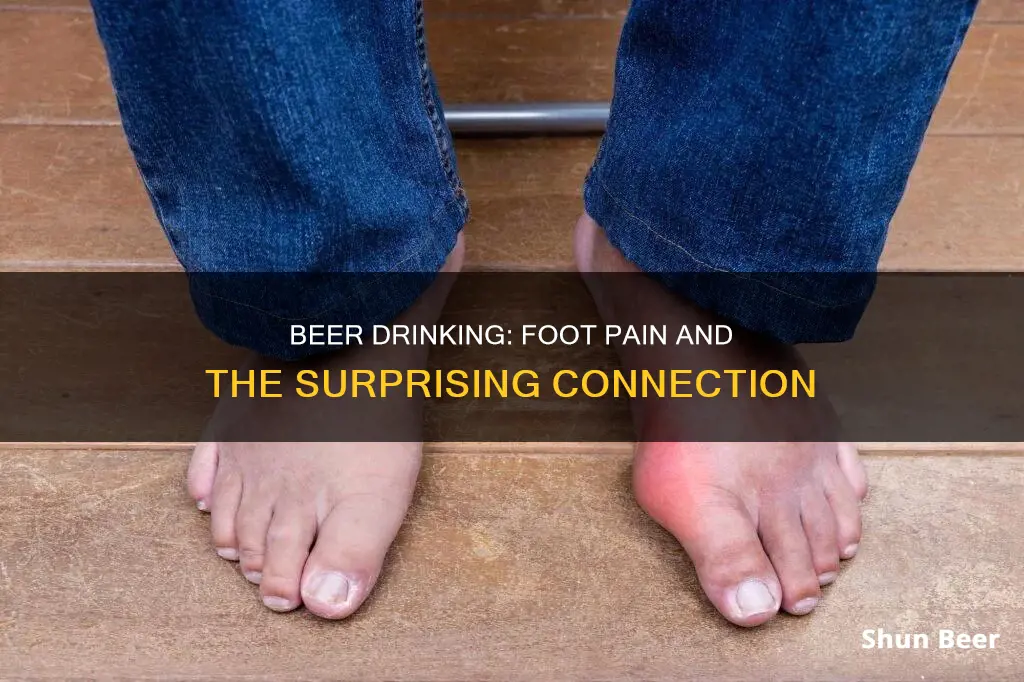
Drinking beer or other alcoholic drinks in moderation is not harmful to the body. However, excessive alcohol consumption can have several negative health effects, including on your feet. Alcoholic neuropathy, a condition caused by nerve damage from long-term alcohol abuse, can lead to numbness, tingling, pain, and weakness in the feet. Additionally, alcohol has a diuretic effect, causing dehydration and fluid retention, which can result in swollen feet. The impact of alcohol on nerve function and nutrient absorption can also increase the risk of injuries and prolong healing time. While occasional drinking is not toxic, heavy drinking can cause serious consequences, and it is important to drink in moderation and seek medical attention if any unusual symptoms occur.
| Characteristics | Values |
|---|---|
| Sensation in feet | Heavy, numb, swollen, tingly, painful |
| Swelling of feet | Dehydration, fluid shift, peripheral edema |
| Health conditions | Gout, osteoporosis, psoriasis, alcoholic neuropathy |
| Alcoholic neuropathy | Nerve damage, loss of sensation, pain, hypersensitivity, muscle weakness |
| Treatment for alcoholic neuropathy | Pain medications, antidepressants, anti-seizure medications, vitamin supplements |
What You'll Learn

Alcoholic Neuropathy
The exact cause of alcoholic neuropathy is not fully understood, but it likely includes both the direct toxic effect of alcohol on neurons and the malnutrition induced by alcohol abuse. Alcohol can cause oxidative stress and inflammation in the body, which has been associated with damage to the myelin around the nerves (demyelination) and important neurons (axonal degeneration). Additionally, alcohol inhibits the absorption of essential vitamins and nutrients for the nervous system, such as vitamin B1 (thiamine).
Symptoms of alcoholic neuropathy include:
- Numbness and tingling in the arms and legs
- Abnormal sensations, such as "pins and needles"
- Painful sensations in the arms and legs
- Muscle problems, including weakness, cramps, aches, or spasms
- Heat intolerance, especially after exercise
- Impotence
- Problems urinating, incontinence, feeling of incomplete bladder emptying, or difficulty starting urination
- Constipation or diarrhea
- Problems swallowing or talking
- Unsteady gait (walking)
- Dizziness or lightheadedness
The first step in treating alcoholic neuropathy is to stop consuming alcohol. Abstaining from alcohol can help restore nutritional health, improve symptoms, and prevent further nerve damage. However, some alcohol-induced nerve damage may be permanent. Treatment for AUD may include medications, cognitive behavioural therapy, counselling, and support groups. Once alcohol use has been addressed, treatment for alcoholic neuropathy itself may include prescription medications, topical medications, and alternative therapies.
Beer and Paracetamol: Safe Mix or Health Risk?
You may want to see also

Dehydration
As the body becomes dehydrated, it triggers a response to compensate for the lost liquid. This is called fluid shift and is the main cause of edema, or water collection in body tissues. Gravity plays a role here, as the fluid that shifts downward can pool in the feet and ankles, leading to swelling known as peripheral edema.
The impact of alcohol on the body's fluid balance can also be seen in the decrease in vasopressin production. Vasopressin is a hormone that signals to the kidneys to reabsorb water rather than flush it out. With less vasopressin, more water is lost through urine.
Additionally, alcohol consumption can impede the delivery of essential nutrients and oxygen to the feet, further contributing to dehydration and related issues.
To mitigate the effects of dehydration caused by alcohol consumption, it is recommended to drink water alongside alcoholic beverages, stay hydrated, and limit alcohol intake by incorporating alcohol-free days into your routine.
Drinking Beer With Z-Pac: What You Need to Know
You may want to see also

Swelling
Drinking beer can indeed cause your feet to hurt, and one of the main reasons is swelling.
Additionally, alcohol interferes with the production of the hormone vasopressin, which is responsible for signalling the kidneys to reabsorb water. With reduced vasopressin, more water is excreted through urine, contributing to dehydration and fluid imbalances.
The swelling caused by alcohol consumption can be a sign of more serious health issues, such as heart problems or liver damage. When the heart struggles to pump blood effectively, it can lead to congestive heart failure, resulting in increased pressure within the veins and fluid leakage into the surrounding tissues, often affecting the lower parts of the body.
Similarly, liver damage caused by excessive alcohol consumption can impair the liver's ability to produce albumin, a protein that helps keep fluid in the bloodstream. Reduced albumin levels can lead to fluid escaping into the tissues, causing edema, particularly in the feet and ankles.
It is important to note that while occasional swelling after drinking alcohol may be temporary and related to dehydration, persistent or severe swelling could indicate more serious underlying health conditions. Therefore, seeking medical attention is crucial if swelling is accompanied by other concerning symptoms.
Antibiotics and Beer: Safe Mix or Health Risk?
You may want to see also

Nerve damage
Alcoholic neuropathy is a result of nerve damage caused by excessive alcohol consumption over a long period. The condition falls into four main categories: decreased sensation, pain/hypersensitivity, muscle weakness, and autonomic effects.
Decreased Sensation
Alcoholic neuropathy damages sensory nerves, resulting in decreased sensation in the hands and feet. This diminished ability to feel pain can lead to frequent bumps, scrapes, infections, and bleeding from minor injuries. It can also cause diminished sensory skills, such as the inability to balance and coordinate fine motor skills like walking and writing.
Pain and Hypersensitivity
Another effect of alcoholic neuropathy is hypersensitivity to touch and even resting pain. Light touch can feel exaggerated and painful, especially in the fingers and toes. The pain can feel like burning, throbbing, or sharp pins and needles, and can vary in intensity over time.
Muscle Weakness
Severe alcoholic neuropathy may cause motor weakness due to nerve damage. Our muscles need to receive messages from nearby nerves to function properly. When this message is interrupted due to nerve damage, the muscles cannot function normally, often resulting in weakness in the hands and feet.
Autonomic Effects
Autonomic nerves control functions such as the bladder, stomach, and intestines. Alcoholic neuropathy can weaken these nerves, causing impairment of bowel and bladder function and sexual dysfunction.
It is important to note that nerve damage caused by alcoholic neuropathy is generally permanent and will likely worsen if the person does not stop drinking. However, abstaining from alcohol can help improve symptoms and prevent further nerve damage.
Beer and Pregnancy: Can Drinking Beer Impact Tests?
You may want to see also

Gout
- Extreme pain
- Redness
- Swelling
It is important to note that gout can be a recurring condition, and managing it effectively requires ongoing medical care and commitment to recommended lifestyle changes.
Silverwood Lake's Beer Rules Explained
You may want to see also
Frequently asked questions
Yes, drinking beer can make your feet hurt. Alcoholic neuropathy, a condition caused by nerve damage from chronic alcohol abuse, can lead to pain, numbness, and tingling in the feet. Additionally, alcohol causes dehydration, which can result in swollen feet and further contribute to foot pain.
Alcoholic neuropathy is a condition that develops due to nerve damage caused by long-term, excessive alcohol consumption. It affects the sensory nerves, leading to decreased sensation and numbness, especially in the hands and feet. This diminished sensation can have serious consequences, making individuals more prone to injuries, infections, and coordination issues.
The symptoms of alcoholic neuropathy include pain, tingling, burning, weakness, and numbness in the feet and hands. Individuals may also experience bruises, cuts, sores, or skin infections on the toes, feet, or fingers, as well as decreased pain sensation and unsteadiness when walking.
To prevent foot pain associated with alcohol consumption, it is essential to drink in moderation and stay hydrated by drinking water along with your beer. Taking breaks from drinking and ensuring adequate nutrient intake can also help prevent alcoholic neuropathy and reduce the risk of foot pain.







